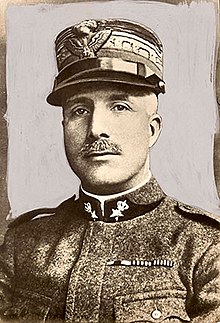Enrico Tellini


Enrico Tellini (25 August 1871 – 27 August 1923) was an Italian general whose assassination provoked the Corfu incident of 1923.
Biography
[edit]Enrico Tellini was born in Castelnuovo di Garfagnana in the province of Lucca in Tuscany. After a childhood in Florence and enlistment in the Italian army he enrolled in classes at a local military college in Florence. In 1901 he was promoted to the rank of major. He participated in the Italo-Turkish War and during the First World War held various posts until he was badly wounded and captured in the battle of Caporetto.[1] After the end of the hostilities, he commanded Italian troops in Albania.
Assassination
[edit]In 1923, Tellini was part of an Italian delegation sent by the League of Nations to survey the disputed border between Greece and Albania. He was shot and killed, along with four companions, when the car he was driving in was stopped by a fallen tree across the road that ran along the disputed border near the town of Ioannina on the way to the Albanian border. The responsible persons were never found. The incident occurred close to the disputed border and could have been carried out by either side. However, the Italians under Benito Mussolini, blamed the Greek side. The Greek side refused any responsibility.[2][3][4][5] The Italians claimed Greece as responsible and there were anti-Greek retaliations in the country.[6][7][8] The Greek government denied responsibility and blamed Albanian bandits in the area.[9] Benito Mussolini demanded 50 million lira in reparations from Greece and the execution of the assassins. On 31 August 1923 Italian troops occupied Corfu in the Corfu incident.[10][11]
Reginald Leeper, the British ambassador at Athens in 1945, in a letter to the British Foreign Secretary in April 1945 mentioned that the Greeks that lived in Albania blame Cham Albanians for the murder of Tellini.[12]
References
[edit]- ^ L'eccidio Tellini. Da Gianina all'occupazione di Corfù (agosto-settembre 1923) di Andrea Giannasi it:Andrea Giannasi, Prospettiva Editrice, 2007, ISBN 88-7418-543-X
- ^ Fellows Nick (2012), History for the IB Diploma: Peacemaking, Peacekeeping: International Relations 1918-36, Cambridge University Press, p. 131, ISBN 9781107613911,
Although the incident occurred close to the disputed border and could therefore have been carried out by either side, the Italians blamed the Greeks.
- ^ Housden Martyn (2014), The League of Nations and the Organization of Peace, Routledge, p. 131, ISBN 9781317862215,
Unfortunately he was murdered, most likely by bandits. Although the culprits were never caught, reports were flashed to Mussolini blaming the Greek side
- ^ Richard C. Hall (2014), War in the Balkans: An Encyclopedic History from the Fall of the Ottoman Empire to the Breakup of Yugoslavia, ABC-CLIO, p. 78, ISBN 978-1610690300,
The Greek delegate eventually accused Tellini of favouring Albanian claims. Then, on 27 August 1923, unknown assailants murdered Tellini and three of his assistants. Some sources attributed the attack to Greek nationalists, but the Greek government stated that Albanian bandits had killed the men, even though they had not been robbed.
- ^ Rudolf Bernhardt (1982), Use of Force · War and Neutrality Peace Treaties (A-M), North Holland, p. 130, ISBN 978-1483249704,
although the assassins were never found, the act was believed to have been motivated by political considerations.
- ^ Phil Wadsworth (2013), Cambridge International AS Level International History 1871-1945 Coursebook (1 ed.), Cambridge University Press, p. 72, ISBN 978-1107613232,
Greece consistently showed little willingness to co-operate with the commission, and when Tellini and three of his Italian assistants were killed by unknown assailants in August 1923, Mussolini was convinced that Greece was responsible.
- ^ Frank McDonough (2011), The Origins of the Second World War: An International Perspective, Bloomsbury Academic, ISBN 978-1441185938,
In Rome, the assumptions were that the assassins were under direct orders of the Greek government...
- ^ Christopher Hibbert (2008), Benito Mussolini: the rise and fall of Il Duce, Palgrave Macmillan Trade, p. 87, ISBN 978-0230606050,
On 27 -August 1923 the Italian General Enrico Tellini, president of the international commission for the demarcation of the Graeco- Albanian frontier, was murdered with three other Italian soldiers by some Greeks who accused him of being ...
- ^ Robert Elsie (2012), A Biographical Dictionary of Albanian History (1 ed.), I. B. Tauris, p. 206, ISBN 978-1780764313,
He was accused by the Greek authorities of the assassination of 27 August 1923 of an Italian general, Enrico Tellini
- ^ THE CORFU INCIDENT OF 1923: MUSSOLINI AND THE LEAGUE OF NATIONS. By James Barros. Princeton, N. J.: Princeton University Press, 1965. Pp. xxi+339
- ^ "Britannica". Archived from the original on 2020-04-11. Retrieved 2014-01-07.
- ^ Robert Elsie; Bejtullah D. Destani; Rudina Jasini (18 December 2012). The Cham Albanians of Greece: A Documentary History. I.B.Tauris. p. 360. ISBN 978-1-78076-000-1.
- 1871 births
- 1923 deaths
- Military personnel from the Province of Lucca
- Military personnel from Florence
- Assassinated Italian military personnel
- Italian military personnel of World War I
- Italian Army generals
- Italian people murdered abroad
- Mass murder victims
- People murdered in Greece
- Italian military personnel of the Italo-Turkish War
- 1923 murders in Greece
- People assassinated in the 20th century
